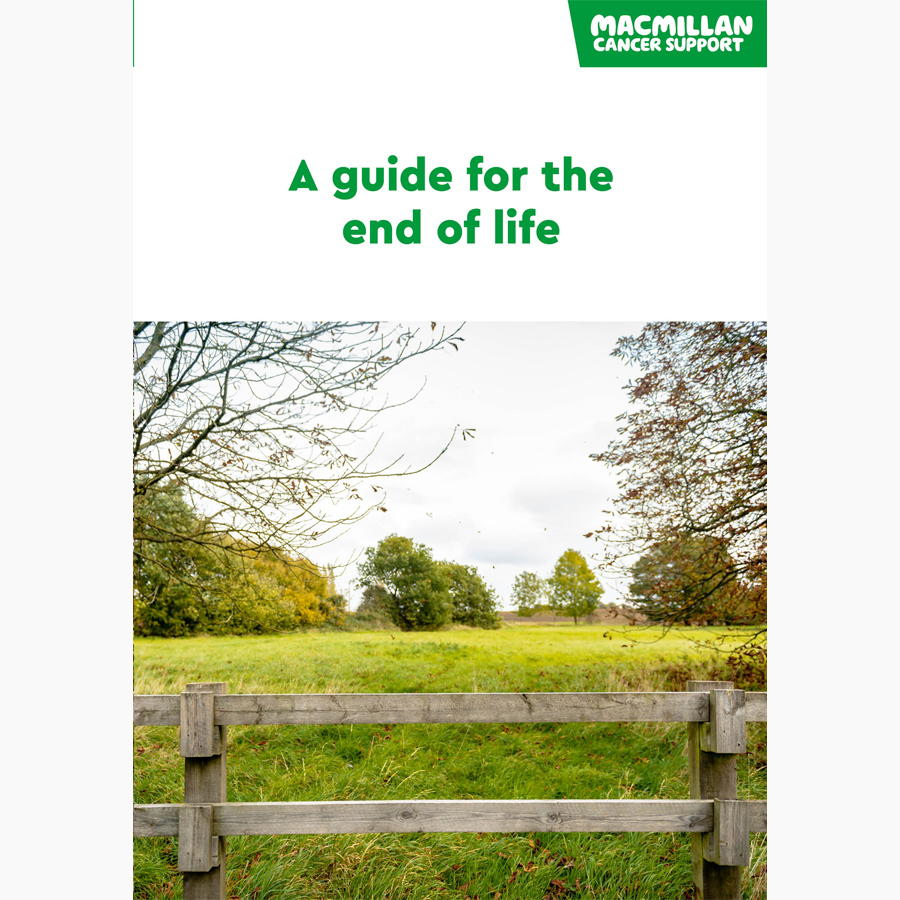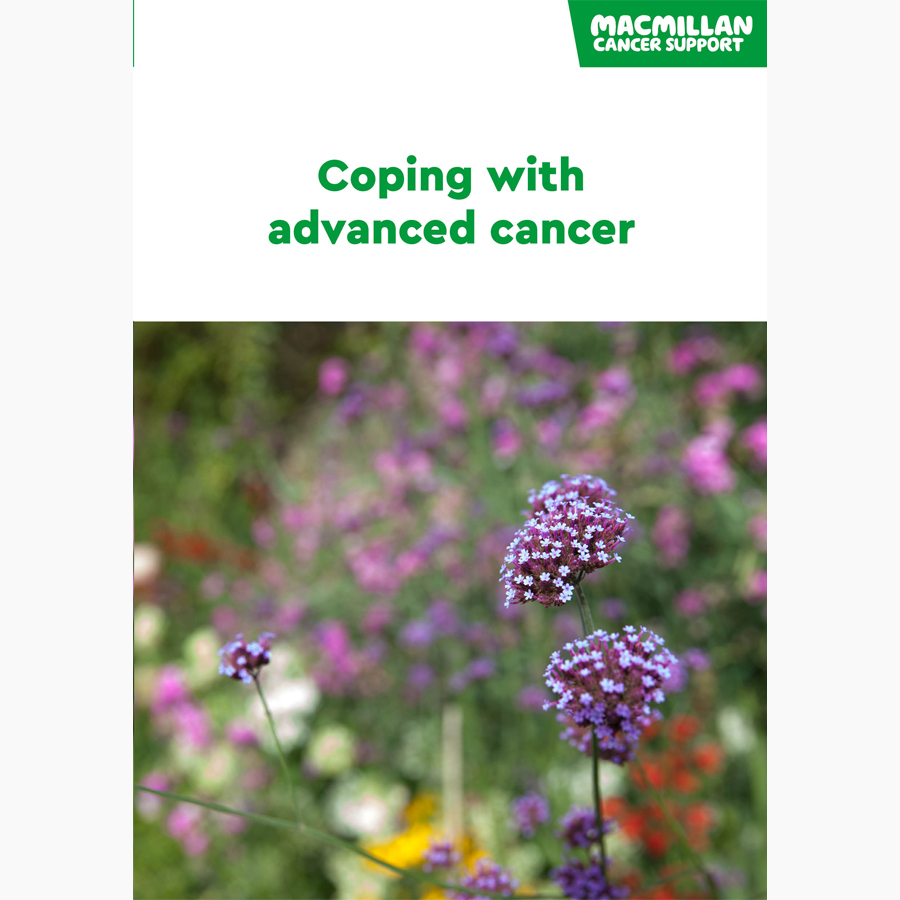Palliative care and cancer
Palliative care may include symptom management, emotional support, and care at home. It is not only about end of life care.
What is palliative care?
Palliative care means the care and support you might need if you have a life-limiting illness, such as cancer. It is often also called supportive care. This varies from person to person, but it can include:
- help to manage symptoms
- emotional support
- advice about practical problems
- support with planning ahead
- support for the people close to you
- practical nursing and personal care
- care in the last months, weeks or days of life.
Related pages
What does palliative care mean for cancer patients?
People sometimes think cancer palliative care only means care at the end of life. But it means much more than this. For cancer that cannot be cured, you might have palliative care soon after diagnosis. Or at several points throughout your treatment.
Here are some things palliative care for cancer might include.
-
Support and advice
Palliative care often involves helping you find any support or information you need to help you cope. You might get this from your palliative care team at your regular appointments with them. But it is usually offered in other ways too. For example, your cancer centre or local hospice might run workshops or support groups that you can go to. Or they may offer complementary therapies or counselling. Ask what is available. These types of support are often also available for family or other people who are close to you if needed.
-
Symptom control
Palliative care health professionals are experts at managing the symptoms. They can assess, treat and give advice about coping with any symptoms caused by cancer at any stage.
-
Palliative cancer treatment
You might have cancer treatment that is described as palliative. This means the aim of your treatment is to manage symptoms caused by the cancer and to improve your quality of life. For example, radiotherapy can be used to improve pain caused by cancer in an area of bone.
-
End of life care
Palliative end of life care includes any support you might need in the last months, weeks and days of your life. This might include symptom control, or emotional support. It might mean physical care and help with practical tasks such as washing and dressing. End of life care can be given in a healthcare setting such as a hospital, care home or hospice. Or it can be given at home.
Palliative care is for anyone living with a life-limiting illness, not just cancer or a certain type of cancer. But if you are looking for information about a specific type of cancer, you can search our A-Z of cancer types. We may have more information about managing symptoms or supportive treatments for some cancer types.
When should someone be offered cancer palliative care?
"Palliative care is there to help with symptoms, benefits and the day-to-day things you may need." Sam, a healthcare professional at Barnsley NHS Hospital Foundation Trust
Some people are referred to a palliative care team early on after a cancer diagnosis. Palliative care is about offering you the right support at the right time. This might be physical, emotional, spiritual or practical support. This is based on your needs rather than life expectancy. Other people may be referred as they approach the end of their life.
Our Online Community is a place to talk, share experiences and find support. You can:
- search by topic or forum
- visit our living with incurable cancer forum
- ask an expert for more information.
Palliative care near me
Palliative care services can vary depending on where you live in the UK. They may be organised slightly differently in different places. This can be confusing. It can be difficult to know what is available in your area and what you should be offered.
You can find out how things work in your area by asking your cancer doctor, specialist nurse, GP or another person in your healthcare team. Often your GP or cancer team are involved in your palliative care. For example, they can help with certain symptoms, or support you with advance care planning. They can also refer you to a specialist team if you need more specialist support or care. This might include:
- Hospital palliative care teams - who can visit you if you are in hospital or attending a clinic appointment.
- Community palliative care teams - these are often linked to a hospice. Members of the team can visit you at home or in a care home. Or you may access their support at a hospice day case service or clinic.
Find out more in your area
Your GP practice is often your first and main point of contact for healthcare. They can tell you about services available in your area. They also often help coordinate and manage your care. This includes any palliative support you might need at different times in the cancer journey.
If you can, it is useful to stay in contact with your GP practice. Tell them if you have symptoms or practical concerns. Ask about anything you do not understand or are worried about. Make sure they know how you are and what is happening. We have more about accessing a GP in our information about navigating healthcare.
The following resources and organisations may also be useful:
- Marie Curie - information and support on all aspects of life with terminal illness, dying and bereavement. Marie Curie services help provide a better end of life for more people, whatever the illness.
- Maggie's - free expert care and support in centres across the UK and online.
- Hospice UK Finder – search for care by postcode, place or organisation name.
- Find palliative care services (England) - search by postcode for services in England.
- Scottish Partnership for Palliative Care - search by area for services in Scotland.
- Find palliative care services (Wales) - search by areas for services in Wales.
- Palliative care services in Northern Ireland - search by Health and Social Care Trust.
Does Macmillan offer palliative care?
There is more about finding your local services in 'Palliative care near me' above. This might include a unit, team or nurse with Macmillan in their job title.
We can also help in these ways:
- Call us free on 0808 808 00 00 or talk to us online - our cancer information and support specialists can offer guidance and help you find what you need.
- Sign up from support from a Macmillan Buddy - a weekly call or visit from a volunteer who understands what you're going through.
- Read our information about different talking therapies and how you might be able to access them
- Our course Help to Overcome Problems Effectively (HOPE) helps people during and after cancer treatment. It is a free, interactive, group based, self management support course. It runs for 6 weeks, with each weekly session lasting 2.5 hours. To find out more about HOPE courses in your area, email ServiceOpsSupport@macmillan.org.uk
Related pages
Palliative care at home
"Good care is about the patient and letting the patient have choices. Cancer is complex and sometimes people need more support when they’re at home. It’s just providing that holistic patient care."
Quote from Tracy, a Clinical Nurse Specialist at Barnsley NHS Hospital Foundation Trust
Palliative care includes the care and support a person may need in the weeks and days at the end of life. This is sometimes called end stage palliative care. It should be available whether you choose to be at home or somewhere like a hospice or hospital.
If you choose and are able to be at home, you may need some care or support to help you manage. You might find our information about being cared for at home helpful. People often have questions about what will happen at the end of life. This can be difficult to talk about. But it is important that you have any support and information you need to make decisions and plan ahead.
Booklets and resources
Useful resources
Here are a selection of palliative care resources you might find helpful.
About our information
This information has been written, revised and edited by Macmillan Cancer Support’s Cancer Information Development team. It has been reviewed by expert medical and health professionals and people living with cancer.
-
References
Below is a sample of the sources used in our advanced cancer information. If you would like more information about the sources we use, please contact us at informationproductionteam@macmillan.org.uk
Health Improvement Scotland/ NHS Scotland. Scottish Palliative Care Guidelines. Available from www.palliativecareguidelines.scot.nhs.uk/ [accessed Nov 2021].
NICE. Care of dying adults in the last days of life. NICE guideline NG31 [Internet]. 2015. Available from www.nice.org.uk/guidance/NG31 [accessed Nov 2021].
NICE. End of life care for adults: service delivery. NICE guideline NG142 [Internet]. 2019. Available from www.nice.org.uk/guidance/ng142 [accessed Nov 2021].
NICE. Improving supportive and palliative care for adults with cancer. Cancer service guideline CSG4 [Internet]. 2004. Available from www.nice.org.uk/guidance/csg4 [accessed Nov 2021].
Date reviewed

Our cancer information meets the PIF TICK quality mark.
This means it is easy to use, up-to-date and based on the latest evidence. Learn more about how we produce our information.
The language we use
We want everyone affected by cancer to feel our information is written for them.
We want our information to be as clear as possible. To do this, we try to:
- use plain English
- explain medical words
- use short sentences
- use illustrations to explain text
- structure the information clearly
- make sure important points are clear.
We use gender-inclusive language and talk to our readers as ‘you’ so that everyone feels included. Where clinically necessary we use the terms ‘men’ and ‘women’ or ‘male’ and ‘female’. For example, we do so when talking about parts of the body or mentioning statistics or research about who is affected.
You can read more about how we produce our information here.
How we can help






